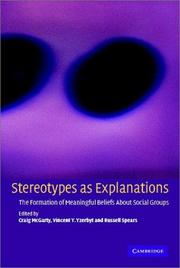| Listing 1 - 5 of 5 |
Sort by
|

ISBN: 0631197729 0631197737 9780631197737 Year: 1997 Publisher: Oxford Blackwell
Abstract | Keywords | Export | Availability | Bookmark
 Loading...
Loading...Choose an application
- Reference Manager
- EndNote
- RefWorks (Direct export to RefWorks)
Group identity --- Social psychology --- Stereotypes (Social psychology) --- Identité collective --- Psychologie sociale --- Stéréotypes --- Group identity. --- Social psychology. --- Sociale psychologie --- groepsdynamica --- Stereotypes (Social psychology). --- groepsdynamica. --- Identité collective --- Stéréotypes --- Mass psychology --- Psychology, Social --- Human ecology --- Psychology --- Social groups --- Sociology --- Collective identity --- Community identity --- Cultural identity --- Social identity --- Identity (Psychology) --- Collective memory --- Mental stereotypes --- Stereotype (Psychology) --- Stereotyping (Social psychology) --- Attitude (Psychology) --- Rigidity (Psychology)

ISBN: 0745308791 Year: 1996 Publisher: London Chicago Pluto Press
Abstract | Keywords | Export | Availability | Bookmark
 Loading...
Loading...Choose an application
- Reference Manager
- EndNote
- RefWorks (Direct export to RefWorks)
Mass psychology --- Psychologie [Sociale ] --- Psychologie sociale --- Psychology [Social ] --- Social psychology --- Sociale psychologie --- Social psychology.
Book
ISBN: 9069842920 Year: 2000 Publisher: Amsterdam Koninklijke Nederlandse akademie van wetenschappen
Abstract | Keywords | Export | Availability | Bookmark
 Loading...
Loading...Choose an application
- Reference Manager
- EndNote
- RefWorks (Direct export to RefWorks)
Group identity --- Individuation (Psychology) --- Social groups --- Social psychology --- Mass psychology --- Psychology, Social --- Human ecology --- Psychology --- Sociology --- Association --- Group dynamics --- Groups, Social --- Associations, institutions, etc. --- Social participation --- Collective identity --- Community identity --- Cultural identity --- Social identity --- Identity (Psychology) --- Collective memory --- Conferences - Meetings

ISBN: 0631206906 0631206914 9780631206910 Year: 1999 Publisher: Malden, MA : Blackwell Publishers,
Abstract | Keywords | Export | Availability | Bookmark
 Loading...
Loading...Choose an application
- Reference Manager
- EndNote
- RefWorks (Direct export to RefWorks)
Context effects (Psychology) --- Group identity. --- Intergroup relations. --- Social groups. --- Social perception. --- Effets de contexte (Psychologie) --- Identité collective --- Relations intergroupes --- Groupes, Dynamique des --- Perception sociale --- #PBIB:1999.3 --- Identité collective --- Intergroup relations --- Group identity --- Social groups --- Social perception --- Cognition, Social --- Interpersonal perception --- Social cognition --- Interpersonal relations --- Perception --- Social cognitive theory --- Association --- Group dynamics --- Groups, Social --- Associations, institutions, etc. --- Social participation --- Conflict, Intergroup --- Intergroup conflict --- Relations, Intergroup --- Social interaction --- Collective identity --- Community identity --- Cultural identity --- Social identity --- Identity (Psychology) --- Social psychology --- Collective memory --- Associations, Contextual (Psychology) --- Context (Psychology) --- Contexts (Psychology) --- Contextual associations (Psychology) --- Contextualism (Psychology) --- Effects, Context (Psychology) --- Psychology

ISBN: 0521804825 0521800471 1107130204 0511177569 0511041357 0511147953 0511305079 0511489870 1280430249 0511047460 9780511177569 9780511489877 9780511041358 9780511047466 9780511147951 9781280430244 9780511305078 9780521804820 9786610430246 6610430241 9780521800471 9781107130203 Year: 2002 Publisher: London New York Cambridge University Press
Abstract | Keywords | Export | Availability | Bookmark
 Loading...
Loading...Choose an application
- Reference Manager
- EndNote
- RefWorks (Direct export to RefWorks)
Stereotyping is one of the biggest single issues in social psychology, but relatively little is known about how and why stereotypes form. Stereotypes as Explanations is the first book to explore the process of stereotype formation, the way that people develop impressions and views of social groups. Conventional approaches to stereotyping assume that stereotypes are based on erroneous and distorted processes, but the authors of this book take a very different view, namely that stereotypes form in order to explain aspects of social groups and in particular to explain relationships between groups. In developing this view, the authors explore classic and contemporary approaches to stereotype formation and advance new ideas about such topics as the importance of category formation, essentialism, illusory correlation, interdependence, social reality and stereotype consensus. They conclude that stereotypes are indeed explanations, but they are nevertheless highly selective, variable and frequently contested explanations.
Stereotype (Psychology) --- Social groups --- Prejudices --- 316.45 --- #SBIB:309H505 --- 316.45 Sociale groepen. Groepsprocessen. Kleine groepen. Interactionele groepsdynamiek --- Sociale groepen. Groepsprocessen. Kleine groepen. Interactionele groepsdynamiek --- Bias (Psychology) --- Prejudgments --- Prejudice --- Prejudices and antipathies --- Attitude (Psychology) --- Emotions --- Association --- Group dynamics --- Groups, Social --- Associations, institutions, etc. --- Social participation --- Mental stereotypes --- Stereotyping (Social psychology) --- Social psychology --- Rigidity (Psychology) --- Code en boodschap: psychologische, psycho-analytische benadering --- Préjugés --- Stereotypes (Social psychology) --- Cognitive psychology --- Philosophy and psychology of culture --- Social groups. --- Prejudices. --- Stéréotypes --- Groupes, Dynamique des --- Health Sciences --- Psychiatry & Psychology
| Listing 1 - 5 of 5 |
Sort by
|

 Search
Search Feedback
Feedback About UniCat
About UniCat  Help
Help News
News